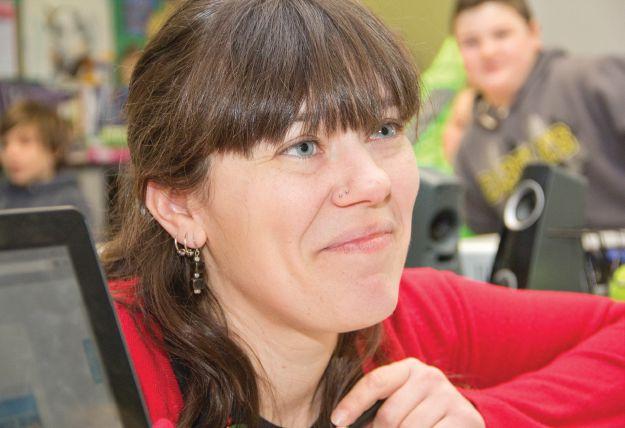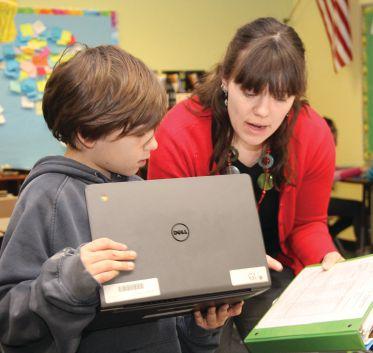
5 minute read
From Homeless to County Teacher of the Year
from Maine Educator April 2016
by Maineea
“I knew education was my way out.” -Fallyn Adams, from homeless student to County Teacher of the Year




As a young 20-something, I accepted a job as an educational technician. That fi rst year, I learned many things about my life. It turns out that I didn’t know it all and that being an educator was hard. Much harder than I had thought.
One particular day, while sitting in a professional development session, I heard someone give such an in-depth defi nition of poverty and homelessness that it gave me chills. In that moment, I realized two truths: I was a child of poverty, and I had been homeless on more than one occasion. I understand how absurd it sounds to have realized as an adult that I grew up poor. We were never homeless in the typical sense. We never lived on the streets. I always had a place to call home, although I always knew it was temporary. I knew, of course, that we didn’t have a lot of money. We moved from rental to rental. We lived with grandparents. We lived with friends. We lived at a campground one summer. In my brain, though, that meant we were fun and adventurous. My parents didn’t let it feel like we were poor, just that we lived diff erently. Free lunch was something that the poor kids had. At my house, we looked for and counted change every morning for lunch house, we looked for and counted change every morning for lunch money.
Growing up, there were three elementary schools in town. One’s address dictated one’s school. Despite moving across town at least once a year, my principal let me stay for my entire K-5 experience. My mom told me it was because I was the smart kid, the good kid, and he needed
more kids like me at his school. As an adult working in education, I became aware that the truth was probably closer to the fact that he felt sad for me—knowing that we would move again, and it was in my best interest to stay in one place.
Understanding my childhood in context was a defi ning moment that forced me to refl ect on my past. I had been the very defi nition of a child at risk, and the odds had not been in my favor. It was not a happy truth to self-realize.
Over the next eight years, I gave my all to a job that didn’t give me much in return. I continued to place myself in the role of “child at risk.” My confi dence was non-existent, and I found myself playing the role of follower and never of leader.
Not too long ago, I took a job in my current district. The people here were amazing, and I started to come out of my shell a little bit. A very little bit. While several peers, my principal included, encouraged me to take a leadership role, I hesitated. Who was I to infl uence people?

Being honored as a County Teacher of the Year has changed some things. While I am still very aware of how I was defi ned as a child, I am opening up to some new ideas and defi nitions. It turns out that what I do is important. It turns out that what I do is pretty darn good. I have a new label, one that I happen to think is pretty impressive.
I can’t rightly capture the feelings of confi dence that this experience has given me, but rest assured that it’s there.
This program has allowed me to fi nally accept what I have held at bay for so long. I am capable of things my childhood labels restricted me from doing. It all seems so simplistic, but trading labels from “homeless”
and “poverty-stricken” to “County Teacher of the Year” has been a game changer.
And I like it. It’s helping to fuel the fi re of what I already do with my students and using that same passion when I interact with adults. In my daily life, I’ve decided that I should have a voice.

If I don’t take a leadership role now, when will I? I need to represent the rest of us. Those of us who label ourselves and doubt our abilities. Those of us who are content being unrecognized. It’s not an easy task to change one’s nature—one’s very core—but I think that this recognition is helping me with that.
My gratitude is endless.
Fallyn Adams teaches fi fth grade at Union Elementary School and is the 2015 Knox County Teacher of the Year; editorial fi rst appeared in the Bangor Daily News.
From Fallyn—How can you help your students in need?
Ask questions.
“Did they take a taxi here this morning? We have a lot of students who are homeless living in hotels they have taxis bring them to school—I've seen a lot over the years. Remember you don’t know what happened before a child came to school.
My 5th grade teacher, he didn't see me as that kid who missed a lot of school and wasn't worth it but he always believed in me. He let me read his ‘special books.’ My teachers treated me like I could do something more, and that meant the world.”
Create a safe environment.
“You have to just be there for them—they have to feel safe. I've seen it with so many kids that they don't feel safe, and then they check out. Knowing where they’re coming from, and understanding it makes you more empathetic to students who are homeless.”
Horace Mann helps fund education
Horace Mann is a national sponsor of DonorsChoose.org, a website dedicated to funding classroom projects. It’s just one way Horace Mann says “thank you” to educators.
To learn more, visit DonorsChoose.org or horacemann.com, or talk to your local Horace Mann agent.










